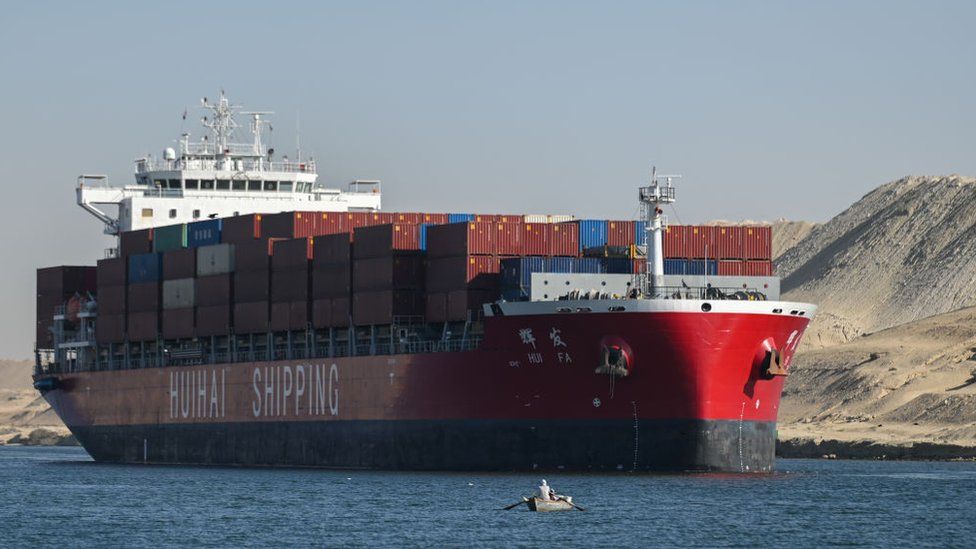
By Lucy Hooker
Business reporter, BBC News
British firms say they are facing higher shipping costs and delays of up to four weeks due to Houthi attacks in the Red Sea, a business group said.
More than a third of the firms surveyed by the British Chambers of Commerce (BCC) said they had been affected.
That figure rose to more than half among exporters responding to the survey.
The added costs could contribute to higher prices in the UK economy generally, the BCC warned.
“There has been spare capacity in the shipping-freight industry to respond to the difficulties, which has bought us some time,” William Bain, BCC head of trade policy, said. “But our research suggests that the longer the current situation persists, the more likely it is that the cost pressures will start to build.”
Exporters, retailers, wholesalers and manufacturers were more likely than other firms to be feeling the impact, the BCC found, leaving some short of goods to sell to customers and components for production lines, or facing cashflow difficulties.
Rerouting shipments around the southern tip of Africa, the Cape of Good Hope, was adding an extra three to four weeks to delivery times, the BCC said, with some firms citing price rises of more than 300% for container hire, it said.
Rachael Waring, managing director of Warings Furniture which imports interior decor for pubs and restaurants, said the conflict had been affecting her business since before Christmas.
Image source, Rachael Waring
Rachael Waring has been facing delays since before Christmas
“We have had to budget for extra costs, because the quotes we’re getting for containers have been considerably higher,” she told the BBC’s Wake Up To Money.
She is also offering clients extra services to make up for delays. But she hopes to counteract some of the cost increases by negotiating lower prices with the Chinese manufacturers she sources from, and avoid further price rises for customers if she can.
The BCC, which represents more than 50,000 businesses across its network, said given the circumstances it would like to see extra government support for exporters, including the formation of an exports council to promote trade.
“The UK economy saw a drop in its total goods exports for 2023, and with global demand weak, there is a need for the government to look at providing support in the March Budget,” Mr Bain said.
The Houthis have attacked commercial vessels traveling through the Red Sea following the start of the Israel-Hamas conflict in October. The Iran-backed group said it was targeting ships linked to Israel, the US and the UK in support of Hamas.
The US and the UK have responded with air strikes on Houthi targets in Yemen.
The Red Sea is the fastest sea route between Asia and Europe. Large shipping firms, including Mediterranean Shipping Company and Maersk, have diverted vessels to the much longer route around Africa’s Cape of Good Hope and then up the west side of the continent. But that has pushed up costs, including for insurance, as well as creating delays.
Earlier this month one of the UK’s best known tea brands, Tetley, warned supplies were “much tighter” than it would like and rival Yorkshire Tea said it was also monitoring the situation closely.
The BCC heard from more than 1,000 firms in their annual survey, which took place between 15 January and 9 February.
Of those responding 90% were small firms, with fewer than 250 employees.








